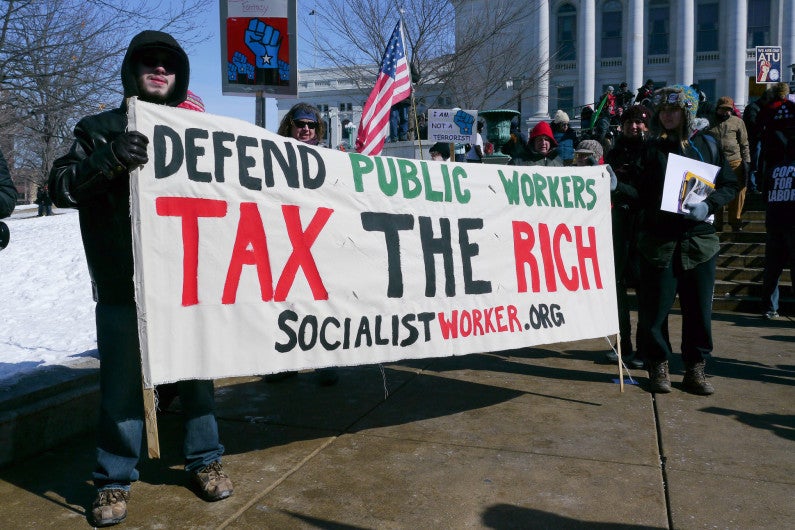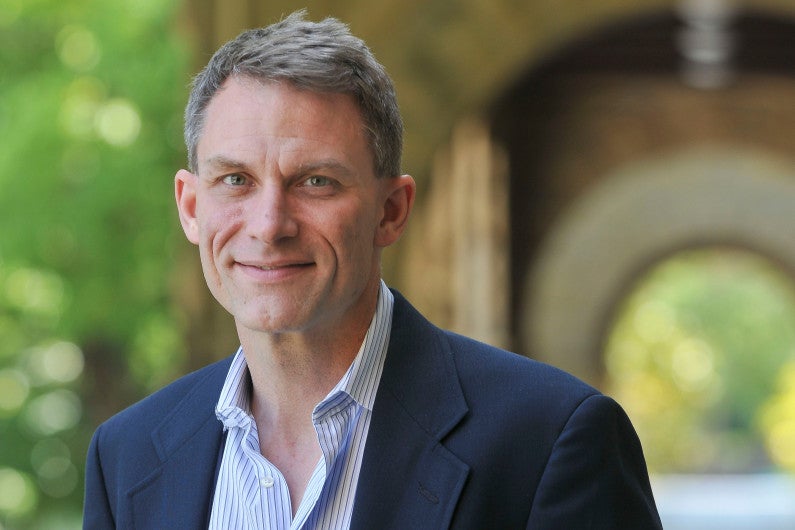Higher taxes for the rich driven by mass mobilizations, changing beliefs, Stanford expert says
Stanford scholar Kenneth Scheve says history shows that mass mobilizations and changing tax fairness norms were key factors behind higher tax rates for the wealthy based on the premise that if labor is conscripted, the wealthy should pay their share, too.
U.S. and European societies tax the rich at higher rates when people believe that the wealthy have unfair privileges due to their economic status, a Stanford professor said.
Kenneth Scheve, a professor of political science and senior fellow at the Freeman Spogli Institute for International Studies, recently published a book, Taxing the Rich: A History of Fiscal Fairness in the United States and Europe, with co-author David Stasavage, a New York University political scientist.

Demands that the wealthy pay more in taxes tend to coincide with moves for more fairness and shared sacrifice, says Stanford Professor Kenneth Scheve. (Image credit: bluecheddar/Flickr/Creative Commons)
Scheve studies international and comparative political economy and comparative political behavior. The Stanford News Service interviewed him about the issue of taxes, the wealthy and inequality.
What are the historical origins behind the decisions for countries to impose high taxes on the rich?
The real watershed for taxing the rich came in 1914. Before that time, even among countries who adopted income taxes, the rates on high earners never exceeded 10 percent. Most countries had some sort of inheritance tax, but rates were never above 15 percent. Among the countries that mass-mobilized for World War I, this changed dramatically with countries adopting top income tax rates that exceeded 70 percent during and immediately after the war. These increases were repeated during World War II with top rates in some countries exceeding 90 percent. We show in the book that these decisions had more to do with changing beliefs about tax fairness and preserving equal sacrifice in the war effort than simply that the wars were expensive. It was not the most financially desperate countries that taxed the rich the most. Democratic countries for which equality fairness norms were the strongest tended to respond to mass mobilization with higher taxes on the rich much more so than non-democracies.
What does your book debunk – what is its most surprising finding?
The two most commonly held ideas about when and why countries tax the rich are when they democratize and when inequality is high. We find surprisingly little evidence for either one of these ideas. The latter finding is particularly important for understanding what’s happening today in countries like the United States that have high and rising economic inequality. A common question is, “Why hasn’t the political system responded with higher taxes on the rich?” In sorting out which answers to this question are compelling, it is critical to understand that this lack of response is not unusual historically, and so answers that emphasize specific purported shortcomings in contemporary American democracy may be misleading.
Do high taxes on the rich actually reduce inequality between the rich and poor?
The short answer is yes. We found that the countries which, for whatever reason, raised taxes on income and wealth subsequently had lower levels of income and wealth inequality. The longer answer is that this finding comes with some caveats. It is hard to identify factors that lead countries to change their tax policies that wouldn’t also influence inequality, making it difficult to isolate the impact of high taxes on inequality.
What roles do war and technology play on the imposition of high taxes on the richest segment?

Kenneth Scheve (Image credit: Rod Searcey)
We found that it is not just war but mass-mobilized wars, often with conscripted armies, that lead countries to impose high taxes on the rich. Technology has played a decisive role in whether countries can and want to fight wars with mass armies in which a substantial proportion of the population is mobilized. It was not possible to transport, supply, and command these armies until the railroad and other technologies of the industrial revolution were developed, and once militaries could employ technologies such as cruise missiles that allowed them to deliver force at a distance with precision, mass armies became much less desirable. The late 19th to the mid-20th century was the era of the mass army and, in many ways, the era of high taxation on incomes and wealth.
Looking ahead, what do you expect to be the future tax burden for those at the top of income and wealth levels?
We should not expect a return to the high top tax rates of the post-war era. Future wars are more likely to be fought with drones and professional soldiers than mass armies. Absent the new fairness arguments that mass-mobilized wars made credible, it is not clear that in most countries, including the United States, there is likely to be a consensus that taxing income and wealth at substantially higher levels is fair. This is the lesson that we draw from history, and it also fits with what many American voters prefer today. When we have conducted surveys on representative samples of Americans, we have found only minority support for implementing a tax schedule radically more progressive than the one in place today.
We do find, however, that citizens care a great deal about tax fairness and there is substantial support for some tax reforms that resonate with a variety of competing visions for what counts as a fair tax system. For example, in the current U.S. tax system, in some instances the rich actually pay a lower rate of tax than everyone else. Reforms to address these privileges seem both desirable and a reasonable expectation for future policy.
